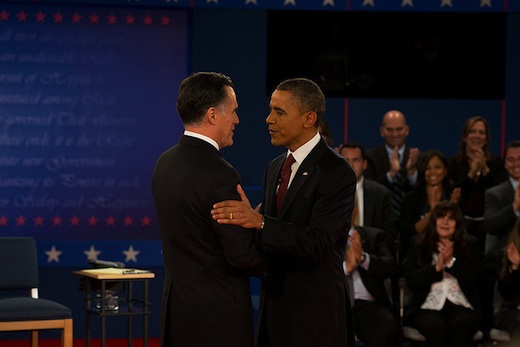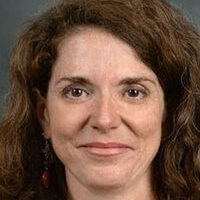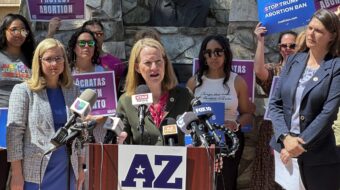
President Barack Obama had the last word in yesterday’s presidential debate, and it was the one his supporters longed to hear, and his opponent longs to forget: 47 percent.
“I believe Governor Romney is a good man. Loves his family, cares about his faith. But I also believe that when he said behind closed doors that 47 percent of the country considered themselves victims who refuse personal responsibility, think about who he was talking about,” seniors, veterans and people who work hard to make ends meet, Obama said.
These are people I am fighting for, he said. “That’s what I’ve been doing for the last four years. Because if they succeed, I believe the country succeeds.”
The debate showed “powerful contrasts in the values of these two people,” observed labor leader Richard Trumka.
To the relief of his supporters, Obama seemed a strong and, at times, combative presence on the stage, forcing Romney on the defensive, where he made more than a few mistakes, missteps and misspeaks.
Thirty-seven percent of undecided voters said Obama won the debate, compared to 30 percent who said Romney did, according to a CBS poll. A CNN poll of registered voters, 46 percent said Obama won, with 39 percent going to Romney. European bookies shortened their odds for the president’s reelection.
For his part, Romney at times seemed elitist with his subsequent mix of arrogance, chauvinism and rudeness, often sharply cutting off the president and moderator Candy Crowley.
Audience members, self-described undecided voters, asked informed and substantive questions on a range of issues. The economy, college costs, energy, equal pay for women, outsourcing and creating jobs, China, gun violence, Libya and immigration were topics, unknown to the candidates beforehand, that reflected the real concerns among the American electorate.
Perhaps the most unexpected (but not uncommon) question came from a woman who asked Romney to differentiate himself from his GOP predecessor.
“Since both you and President Bush are Republicans, I fear a return to the policies of those years should you win this election. What is the biggest difference between you and George W. Bush, and how do you differentiate yourself from George W. Bush?”
Romney fled from the Bush legacy. Obama, however, associated the governor’s pro-1% economic plan with Bush’s, and in a savvy move, exposed Romney as more extreme on immigration, Medicare and women’s health.
“George Bush didn’t propose turning Medicare into a voucher. … He didn’t call for self-deportation. George Bush never suggested that we eliminate funding for Planned Parenthood …” the president said. (See “Second debate makes repressive Romney immigration policy crystal clear” for more on the issue.)
The president laid out his second term priorities: build on the 5 million jobs that he said have already been created, with investments (using money saved by ending two costly wars) in education, energy and infrastructure; encourage manufacturing jobs through tax breaks for companies that keep and create jobs here; help small businesses grow; reduce the deficit in a “balanced way” by making the top 1% “pay their fair share” in taxes.
After Obama criticized Romney for advocating “Detroit go bankrupt,” the Republican shot back that he had a “five-point plan” to create “12 million new jobs in four years.”
Obama zinged, “Governor Romney doesn’t have a five-point plan. He has a one-point plan,” and that is to help the super rich get richer.
Sensata and other workers from Bain Capital-owned corporations protesting outsourcing and other “Romneynomics” outside Hofstra University in Hempstead, N.Y., where the debate was being held, must have cheered when the president lambasted how Romney got his fortune, “You can invest in a company, bankrupt it, lay off the workers, strip away their pensions, and you still make money.”
The question on Libya most flustered the Republican. Getting caught in the weeds of word parsing, Romney accused the president of not calling the attack “terrorist.” To which Obama replied that wasn’t true. Romney, surprised by the president’s answer, pressed him on it. That’s when Crowley weighed in and said the president was right, he called it an “act of terror,” which left Romney stammering.
But it was the discussion on equal pay for women and limiting access to assault weapons that provided the clearest window into the Republican’s “Father Knows Best” reactionary ideology. Romney blamed mass shootings and gun violence on single parents and the supposed break down of the family.
He was quiet on pay equity, never uttering a word about it. Instead he claimed as governor he went on a search for “qualified women” to serve in his cabinet. Then blurting out a phrase heard round the world, he said as if astonished, women’s groups provided him “whole binders full of women.” (In fact, Romney lied about that. He didn’t seek these binders after being elected, the groups sent them to the candidates before the election.)
Yet it begged the question: Didn’t Romney have contacts with “qualified” women, through his campaign for governor of Massachusetts or through Bain Capital? The answers seem to point to an antiquated view of more than half the population.
In contrast, Obama explained his support for equal pay for women, using personal stories of his single-mom and his grandmother who hit against the glass ceiling. He explained why he signed the Lilly Ledbetter Act and its history. He then pivoted and tied women’s health and childcare needs as part of the holistic, real and modern picture of women and families’ economic lives.
To see peoplesworld tweets on the debate click here and scroll down timeline to Oct. 16.
Photo: (OFA/Scout Tufankjian/CC)












Comments